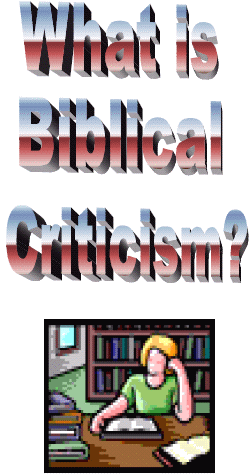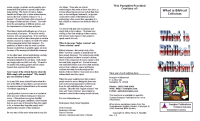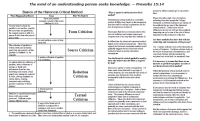
| ||
|
Book Catalog Tracts Catalog Retail Store Bible Resource Store Energion Publications |
||
Participatory Study Series Pamphlets
What is Biblical Criticism?
|
|
Other formatsThe Historical-Critical Method is available in PDF format and Word document format. You can find our permission to print these pamphlets at the Participatory Study Series index.
|
The mind of an understanding person seeks knowledge. - Proverbs 15:14

What is meant by the historical-critical method?
The historical-critical method is a scientific method of Bible study based on the assumption that there will be rational explanations for the text of scripture as we have it.
That means that there are human authors who use oral traditions and textual sources and compose texts in the way that other authors do.
It differs from the historical-contextual method largely in the claimed assumptions. Those who support the historical-contextual method would generally suggest that the historical-critical method is based on purely naturalistic assumptions.
Can the historical critical method be used by those who believe that the Bible is inspired by God?
There are a variety of views of inspiration. Of these views, those that hold to any type of verbal dictation, the view that the very words of scripture were dictated by God, would be incompatible with the historical critical method.
Others will find that the various critical methodologies are helpful in learning to understand the text of scripture. Some of these methods are used in the historical-contextual study. The primary difference is one of perspective rather than a fundamental difference. Those who hold to the contextual method are generally more conservative in their approach and in their conclusions, and generally are more concerned with the final form of the text of scripture. Those involved in the critical method tend to be more willing to speculate and also are more concerned with the process by which scripture got to its present form.
Those who take a high view of scripture, including those who accept the Chicago Statement on Biblical Inerrancy use various of the methods that are part of the historical-critical method. Clearly there will be differences in how one will use these methods depending on one's view of the role of divine inspiration in the production of the text.
Are there methods that don't deal with the authorship and transmission of the passage?
Yes. Literary criticism looks at the document as a piece of literature. Tradition criticism looks at the whole of the process of transmission, and canonical criticism which examines the scriptural text in its final (or canonical) form.
Is it necessary to assume that there are no miracles or predictive prophecy in order to use the historical-critical method?
While the historical-critical method looks for natural explanations, it is not necessary to assume that there is no supernatural involvement in producing the Biblical text. It is necessary to look for natural methods as the primary mode of producing the text.
If you assume that the words of scripture were dictated by God through the Biblical writers, and thus the entire text is produced directly by supernatural processes, then the critical methodologies would not be applicable. Oral transmission, use of source documents and editing are all not compatible with direct divine dictation.
But the evidence of scripture itself suggests that while God inspired the message, there is a substantial role for natural processes. Some stories, sayings, prophetic oracles parables were transmitted from person to person orally before being written. The books of Joshua, Judges, Samuel and Kings refer to other written sources, such as the book of Jasher (Joshua 10:13, 2 Samuel 1:18) and the books of the chronicles of the kings of Judah and also of Israel. The books show the personalities of different authors, and the characteristics of their time and place.
Thus these critical methodologies are of use in a serious study of scripture. We must be careful, however, with our assumptions. If we read that a certain event could not have taken place as written because a miracle is required, we need to be aware of the assumption behind that statement. If a prediction is dated to after the event it predicts because no prediction is possible, again, we must be aware of the assumption behind this statement.
On the other hand, critical methodology can help keep us from assuming miracles that the scriptures themselves do not claim. Such claims can simply make our faith look silly. We need to be careful with making greater miracle claims beyond what scripture itself claims.
Aren't many of the critical theories about the Bible simply wild speculation? Why should I pay any attention to them?
As in any field, many critical theories about the text of the Bible are speculative, and each should be understood and evaluated based on the amount of evidence supporting it.
A good practice is never to come to a conclusion about any issue without reading more than one source. Often authors are express doubtful conclusions with great confidence, either because they are more sure of themselves than they ought to be, or because they hope that people won't question them because of their assurance.
Be very wary of this tactic when used on any side of a debate. Those who use critical methodologies often sneer at those who don't, or at those whose theories are less radical than their own, as less intelligent, backwards, or ignorant. Conservative critics of the historical critical methodology often accuse their opponents of a lack of faith or a desire to tear down the faith of others.
You should look past such accusations and simply look at the evidence. Christians have nothing to fear from studying evidence openly, and we have every reason to want people to openly search for truth.
What do the terms "higher criticism" and "lower criticism" mean?
Biblical criticism-the critical study of the Bible-involves a number of methods that we have already discussed. The method most solidly based on physical evidence is textual criticism, which is the comparison of various copies to find the most likely original text. Textual criticism was established before most of the other methods, such as form, redaction, source and literary criticism that study the authorship and the history of the text before it was made into a final edition which was then copied.
When the newer methods were first invented people needed a way to distinguish these new, more controversial approaches to Bible study from the well established idea of textual criticism. Thus the label "higher criticism" was born, and "lower criticism" was invented in reaction to describe the existing textual criticism.
For more information see:
Participatory Study Series Pamphlets:
Form Criticism (coming soon)
Redaction Criticism (coming soon)
Source Criticism (coming soon)
Literary, Canonical and Genre Criticism (coming soon)
Understanding the Search for the Historical Jesus
Energion Publications
P. O. Box 841
Gonzalez, FL 32560
Phone: (850) 525-3916
Web: Energion Publications (http://energion.com)
E-Mail: pubs@energion.com
This brochure is available in quantity. Contact Energion Publications for more information.
All scripture quotations taken from the Contemporary English Version, Copyright © 1995 American Bible Society.
Copyright © 2004, Henry E. Neufeld
Rev. 1.0


 .
.